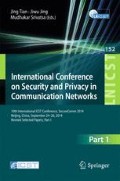Abstract
Privacy protection has become a crucial issue in the information era. In recent years, many protocols have been developed to accomplish computational tasks collaboratively without revealing the participants’ private data. However, developing protocols for each individual application would not be practical. The more natural and efficient approach would be utilizing basic protocols as building blocks for the construction of complex protocol.
In this paper, we proposed the concept of t-certified protocols, which are protocols that are secure when t parties are under the influence of a semi-honest adversary. A composition theorem is given to specify the conditions for secure composition of t-certified protocols, and a framework for constructing complex protocols is developed.
We have adopted an information theoretical approach, and believe that it will be a viable alternative to the classic simulator approach, which is based on the concept of indistinguishability between the ideal model and the real model.
Access this chapter
Tax calculation will be finalised at checkout
Purchases are for personal use only
Notes
- 1.
Occasionally, \(Y_m\) could be an empty function so that the following equation also holds:
$$ I( Y_1; Y_2, \ldots , Y_{m-1}, R ) = I( Y_1; Y_2, \ldots , Y_{m-1}). $$ - 2.
Since \(n=2^{k+1}\), the overflow bit \(c^{k+1}\) is discarded.
References
Yao, A.: How to generate and exchange secrets. In: Proceedings of the 27rd Annual IEEE Symposium on Foundations of Computer Science, pp. 162–167, November 1986
Goldreich, O., Micali, S., Wigderson, A.: How to play any mental game, or: a completeness theorem for protocols with honest majority. In: Proceedings of 19th ACM Symposium on Theory of Computing, pp. 218–229 (1987)
Kushilevitz, E., Lindell, Y., Rabin, T.: Information-theoretically secure protocols and security under composition. In: Proceedings of the Thirty-eighth Annual ACM Symposium on Theory of Computing, STOC 2006, pp. 109–118. ACM, New York (2006)
Beaver, D.: Secure multiparty protocols and zero-knowledge proof systems tolerating a faulty minority. J. Cryptol. 4(2), 75–122 (1991)
Dwork, C., Naor, M., Sahai, A.: Concurrent zero-knowledge. J. ACM 51(6), 851–898 (2004)
Lindell, Y.: Composition of Secure Multi-Party Protocols: A Comprehensive Study. LNCS, vol. 2815. Springer, Heidelberg (2003)
Canetti, R.: Universally composable security: a new paradigm for cryptographic protocols. In: Proceedings of the 42nd IEEE Symposium on Foundations of Computer Science, FOCS 2001, p. 136. IEEE Computer Society, Washington, D.C. (2001)
Canetti, R.: Security and composition of cryptographic protocols: a tutorial (part i). SIGACT News 37(3), 67–92 (2006)
Durgin, N., Mitchell, J., Pavlovic, D.: A compositional logic for proving security properties of protocols. J. Comput. Secur. 11(4), 677–721 (2003)
Datta, A., Derek, A., Mitchell, J.C., Roy, A.: Protocol composition logic (pcl). Electron. Notes Theoret. Comput. Sci. 172, 311–358 (2007)
Canetti, R.: Security and composition of multiparty cryptographic protocols. J. Cryptol. 13, 143–202 (2000)
Goldreich, O.: Foundations of Cryptography: Basic Applications, vol. 2, 1st edn. Cambridge University Press, Cambridge (2004)
Cover, T.M., Thomas, J.A.: Elements of Information Theory. Wiley, New York (1991). Schilling, D.L. (ed.)
Yao, A.C.: Protocols for secure computations. In: Proceedings of the 23rd Annual IEEE Symposium on Foundations of Computer Science, pp. 160–164, November 1982
Kerschbaum, F., Biswas, D., de Hoogh, S.: Performance comparison of secure comparison protocols. In: 20th International Workshop on Database and Expert Systems Application, 2009, DEXA 2009, pp. 133–136 (2009)
Damgard, I., Geisler, M., Kroigard, M.: Homomorphic encryption and secure comparison. Int. J. Appl. Cryptogr. 1(1), 22–31 (2008)
Shundong, L., Yiqi, D., Qiyou, Y.: Secure multi-party computation solution to yao’s millionaires’ problem based on set-inclusion. Prog. Nat. Sci. 15(9), 851–856 (2005)
Garay, J., Schoenmakers, B., Villegas, J.: Practical and secure solutions for integer comparison. In: Okamoto, T., Wang, X. (eds.) PKC 2007. LNCS, vol. 4450, pp. 330–342. Springer, Heidelberg (2007)
Zhao, B., Delp, E.J.: Secret sharing in the encrypted domain with secure comparison. In: Global Telecommunications Conference (GLOBECOM 2011), pp. 1–5. IEEE (2011)
Kaghazgaran, P., Sadeghyan, B.: Secure two party comparison over encrypted data. In: World Congress on Information and Communication Technologies (WICT 2011), pp. 1123–1126 (2011)
Toft, T.: Sub-linear, secure comparison with two non-colluding parties. In: Catalano, D., Fazio, N., Gennaro, R., Nicolosi, A. (eds.) PKC 2011. LNCS, vol. 6571, pp. 174–191. Springer, Heidelberg (2011)
Shen, C.-H., Zhan, J., Hsu, T.-S., Liau, C.-J., Wang, D.-W.: Scalar-product based secure two-party computation. In: IEEE International Conference on Granular Computing, GrC 2008, pp. 556–561 (2008)
Du, W., Atallah, M.J.: Privacy-preserving cooperative statistical analysis. In: ACSAC 2001: Proceedings of the 17th Annual Computer Security Applications Conference, pp. 102–110. IEEE Computer Society, Washington, D.C. (2001)
Chiang, Y.-T., Wang, D.-W., Liau, C.-J., Hsu, T.: Secrecy of two-party secure computation. In: Jajodia, S., Wijesekera, D. (eds.) Data and Applications Security 2005. LNCS, vol. 3654, pp. 114–123. Springer, Heidelberg (2005)
Du, W., Zhan, Z.: Building decision tree classifier on private data. In: Proceedings of the IEEE International Conference on Privacy, Security and Data Mining, CRPIT 2014, pp. 1–8. Australian Computer Society Inc., Darlinghurst (2002)
Du, W., Zhan, J.: A practical approach to solve secure multi-party computation problems. In: Proceedings of New Security Paradigms Workshop, Virginia Beach, Virginia, USA, September 2002
Author information
Authors and Affiliations
Corresponding author
Editor information
Editors and Affiliations
Rights and permissions
Copyright information
© 2015 Institute for Computer Sciences, Social Informatics and Telecommunications Engineering
About this paper
Cite this paper
Chiang, YT. et al. (2015). An Information-Theoretic Approach for Secure Protocol Composition. In: Tian, J., Jing, J., Srivatsa, M. (eds) International Conference on Security and Privacy in Communication Networks. SecureComm 2014. Lecture Notes of the Institute for Computer Sciences, Social Informatics and Telecommunications Engineering, vol 152. Springer, Cham. https://doi.org/10.1007/978-3-319-23829-6_28
Download citation
DOI: https://doi.org/10.1007/978-3-319-23829-6_28
Published:
Publisher Name: Springer, Cham
Print ISBN: 978-3-319-23828-9
Online ISBN: 978-3-319-23829-6
eBook Packages: Computer ScienceComputer Science (R0)

